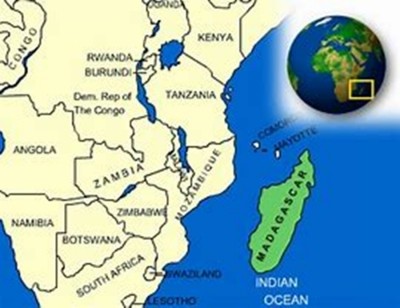
New Delhi, Madagascar is the largest island in the Indian Ocean region. The Francophone state is located in the Southwest Indian Ocean off the coast of Mozambique. Strategically important countries like Seychelles and Mauritius and the French Indian Ocean Island territories like R�union and Mayotte are part of Madagascar's neighbourhood. The Mozambique Channel links Madagascar with the African mainland. Due to the geographic location, Madagascar enjoys a dual identity: it is an African country that is also an Indian Ocean Island state.
As the strategic rivalries sharpen across the Indo-Pacific region including in the Western Indian Ocean (WIO), Madagascar too cannot stay aloof from evolving geopolitics. Last month, foreign minister Richard Randriamandrato was in India for the annual Raisina Dialogue. In an interview with WION, he articulated Madagascar's approach to the Indo-Pacific. Explaining the rationale for his visit, Randriamandrato said that "The war in Ukraine is a global concern and Madagascar and India abstained" in the United Nations. Madagascar wanted to discuss "global issues like climate change and the follow up of COP 26, as well as terrorism and, of course, the Indo-Pacific region."
Madagascar and India are close partners and the security cooperation, especially in the maritime domain is deepening. The minister added that "there are many opportunities for India and Madagascar to strengthen military cooperation without any biases on how we use military cooperation, be it for the Indian defence or for Madagascar." The Indo-Pacific framework adds an important dimension to the India-Madagascar partnership.
When asked about his views on the Indo-Pacific, Randriamandrato observed that "I think it's a very legitimate vision" as "Madagascar is situated geographically on the western side of the Indian Ocean. India is in between the Pacific and the Indian Ocean. It goes without saying that we have to look forward and have a common willingness for a common destiny."
According to him, "we have to strengthen dialogues to make sure that we address the issue of terrorism, piracy, transnational organised crime, and illegal fishing as well" In fact, most states in the WIO region share concerns regarding these issues. He further observed that "the Indian Ocean and Pacific are strategic oceans for any superpower". In his view, Madagascar sees "the ambition to have a common understanding" to address these issues "globally within these geographic areas". He believes that "there are many countries that are concerned with these issues, and we need to enhance dialogue so that we go in the same direction in the near future".
While talking about China, the minister made it clear that "we may have issues with China on illegal fishing and other issues as well, but we are not an enemy of China". He added that "we cooperate with everybody who would like to support us in developing our island". Randriamandrato expressed hope that "the border issue will be solved between India and China. But as far as Madagascar is concerned, we have no problem with China, for the time being, we continue to cooperate and solve problems diplomatically."
The China-Madagascar relationship has blossomed in the last few years with the Chinese companies taking a greater interest in sectors like mining and energy. China is Madagascar's largest trading partner and the resource-rich island country is home to the second-largest Chinese diaspora in Africa as well. Hence, it is not surprising to see Madagascar taking a neutral stand on the India-China border dispute. However, for India, given the recent developments in Sri Lanka, the strategic implications of Chinese investments in Madagascar would remain a concern.
It is obvious that Madagascar's view of the Indo-Pacific is shaped by two drivers: first, addressing the most pressing challenges, primarily, in the realm of non-traditional security like terrorism, maritime piracy, transnational crime, and illegal fishing. These issues directly affect the well-being of the Malagasy population and are critical issues in the regional security debates of the Southwest Indian Ocean. Therefore, in an evolving framework of the Indo-Pacific, Madagascar seeks to underscore the importance of these issues.
Maritime piracy remains a threat in the WIO as important trade routes pass through the region and the Mozambique Channel is a vital maritime chokepoint. The terrorist activities in Somalia as well as the Islamist insurgency in Northern Mozambique heighten the security concerns for Madagascar.
The second driver is to engage major powers like India and China to ensure necessary diplomatic, security, and economic support. That's why the minister underscored that "we have no enemy in Madagascar." It's a clear message that, for now, Madagascar will not choose any one side in the Indo-Pacific rivalries. While China remains a major player in the domain of trade and investments, Madagascar seeks Indian investments in developing port infrastructure and building security capabilities.
Madagascar is an active and important member of the Djibouti Code of Conduct and the Indian Ocean Commission (IOC). Madagascar welcomes a greater Indian role in the region. The minister believed that the invitation to India's External Affairs Minister to attend the IOC summit chaired by Madagascar "will be a symbolic, important sign of the quality of the relationship and is important in this context of the Indo-Pacific vision".
While the great power rivalries dominate the discourse about the Indo-Pacific, the smaller yet strategically important states too are voicing their concerns. Madagascar is part of India's maritime neighbourhood and is a key partner in the WIO. Therefore, understanding Madagascar's view of the Indo-Pacific is necessary.


.jpeg)

